November 30 ,2016 – In this final posting Peter Diamandis talks about the importance of mindset in education. What is mindset? It is about attitudes. Changing the way we do things is sometimes hard because we approach subjects with established ideas. For example, perception based on previously held views, something we call gestalt, often determines beliefs and actions. Diamandis argues that we have to wipe the slate clean in education in the 21st century. He states that attention to mindset in elementary schools gives a child a mental operating system that will serve him or her throughout life. Here are the mindsets and behaviours he believes schools need to begin promoting now.
Nurturing Optimism & An Abundance Mindset:
We live in a competitive world, and kids experience a significant amount of pressure to perform. When they fall short, they feel deflated. We all fail at times — that’s part of life. If we want to raise “can-do” kids who can work through failure and come out stronger for it, it’s wise to nurture optimism.
Optimistic kids are more willing to take healthy risks, are better problem-solvers and experience positive relationships. You can nurture optimism in a school by starting each day focusing on gratitude (what each child is grateful for),
or
on positive focus with each student taking 30 seconds to talk about what he or she is most excited about,
or
on what recent event the student feels has been positively impactful to he or she.
Finally, helping students understand (through data and graphs) that the world is in fact getting better (see my first book: Abundance: The Future is Better Than You Think) helps counter the continuous flow of negatives flowing through the news media.
When kids feel confident in their abilities and excited about the world, they are willing to work harder and be more creative.

Tolerance for Failure:
Tolerating failure is a difficult lesson to learn and a difficult lesson to teach. But it is critically important to success in life.
Astro Teller, who runs Google’s innovation branch “X,” talks a lot about encouraging failure. At X, they regularly try to “kill” their ideas. If they are successful in killing an idea, and thus “failing,” they save lots of time, money and resources. The ideas they can’t kill survive and develop into billion-dollar businesses. The key is that each time an idea is killed, Astro rewards the team — literally, with cash bonuses. Their failure is celebrated and they become a hero.
This should be reproduced in the classroom: kids should try to be critical of their best ideas (learn critical thinking), then they should be celebrated for “successfully failing” — perhaps with cake, balloons, confetti and lots of Silly String.
Although the shortest part in this 4-posting series I am convinced that encouraging and nurturing optimism as part of a creative process that also includes critical analysis to expose flaws produces positive end results. I would love to hear from teachers who read the articles posted on this blog site to get their feedback on Diamandis’ ideas about elementary school teaching methodology and curricula. I would also recommend that you review previous postings on “education” using the search field on the website. You will find discussions about education and the 4th industrial revolution, learning in the 21st century, raising children in exponential times, gamification and the Global Learning XPrize.
On this last day of November I once again thank the many tens of thousands of you who continue to visit this site and encourage those of you who would like to provide content to contact me at rosen.len@gmail.com.









